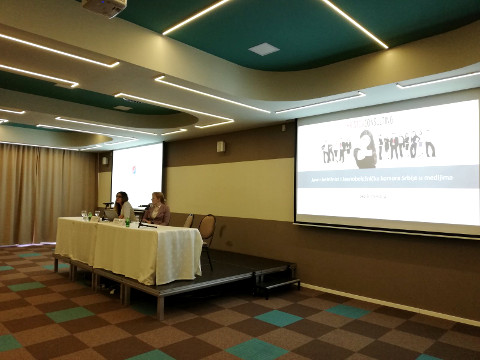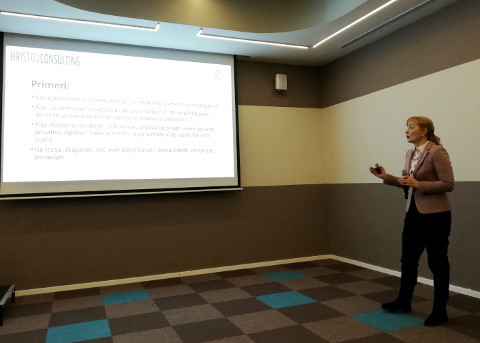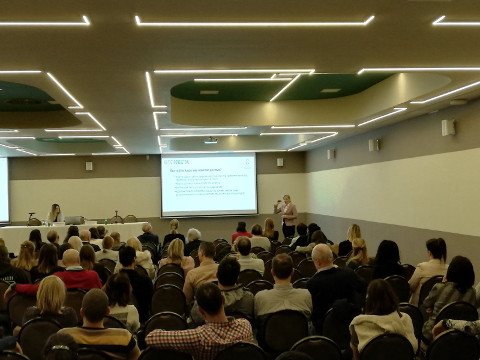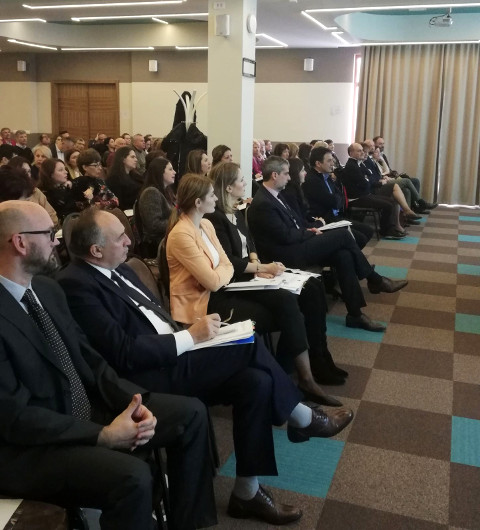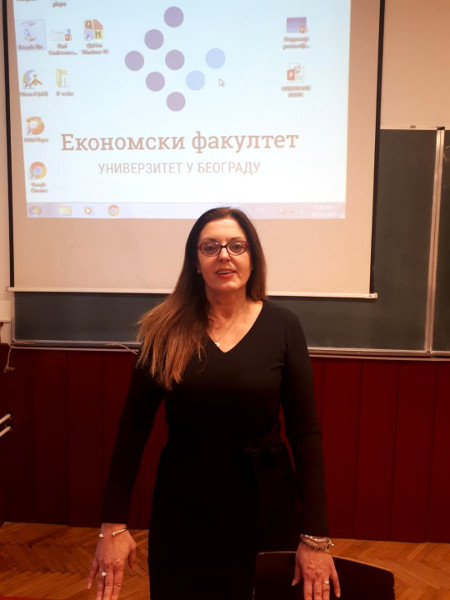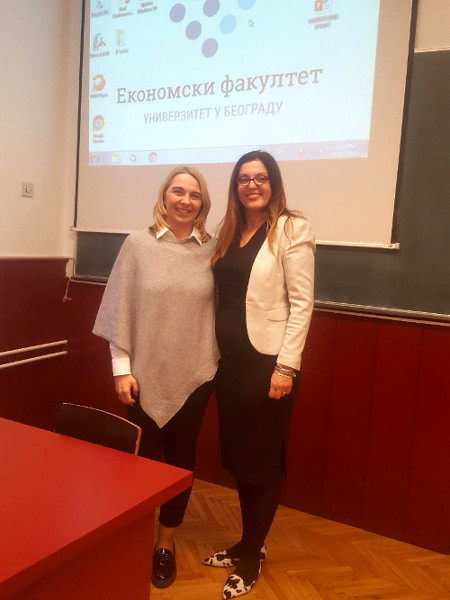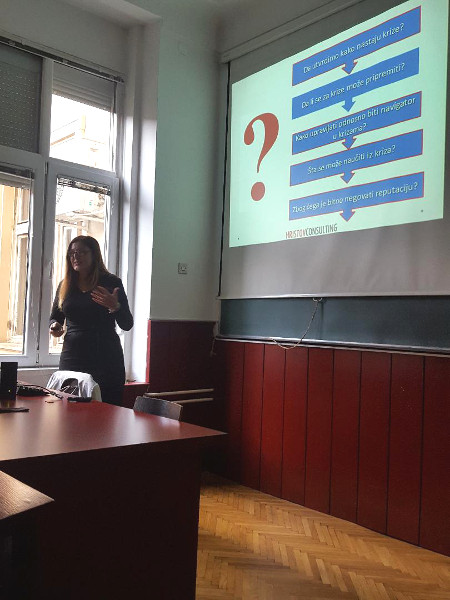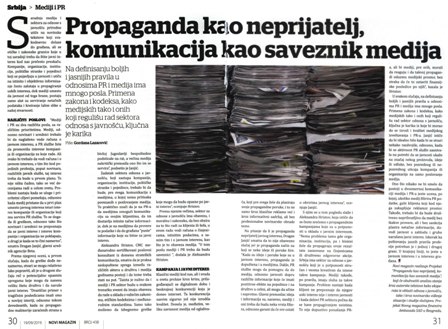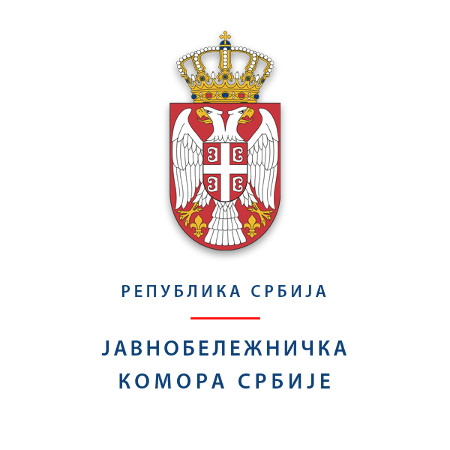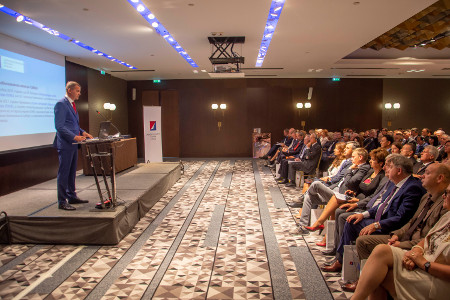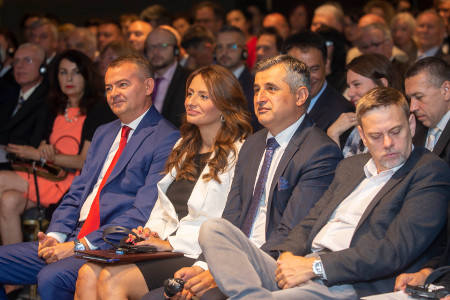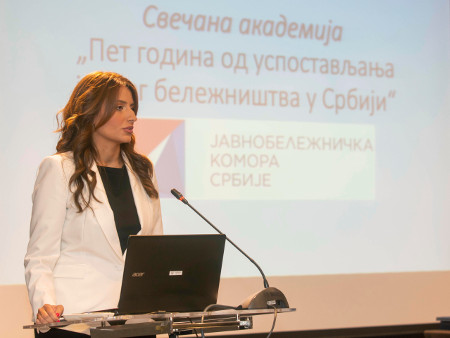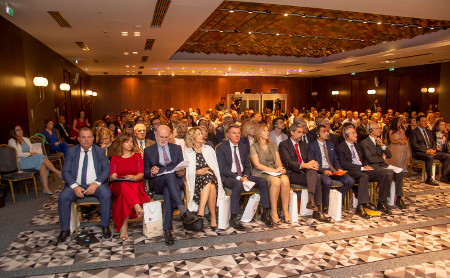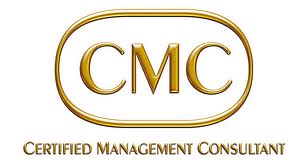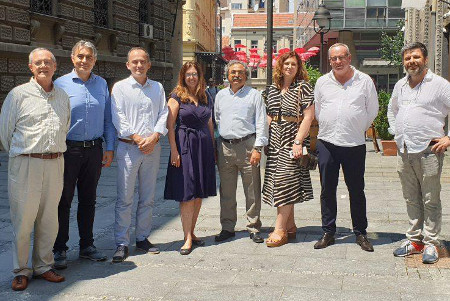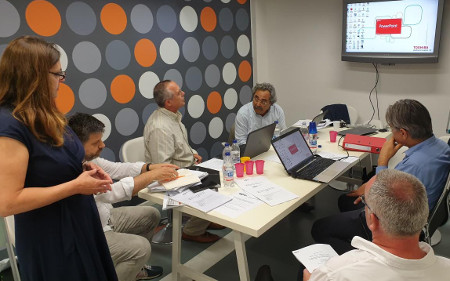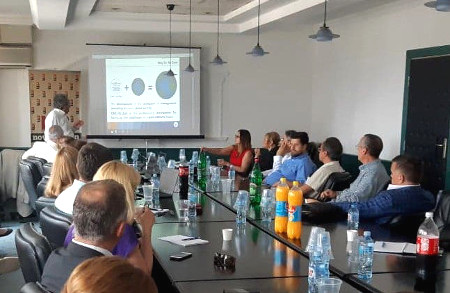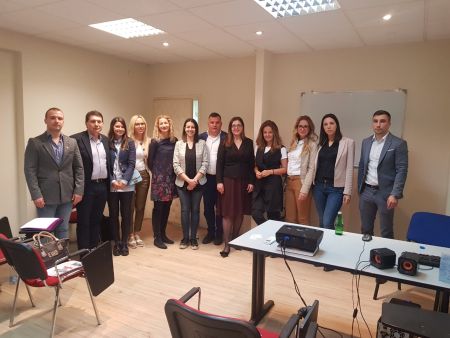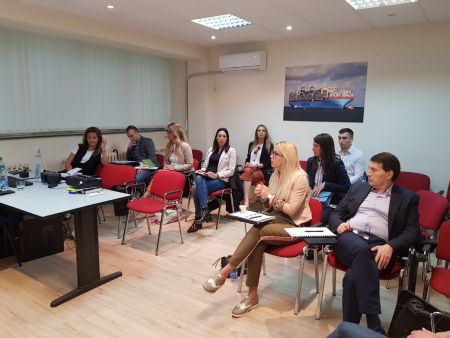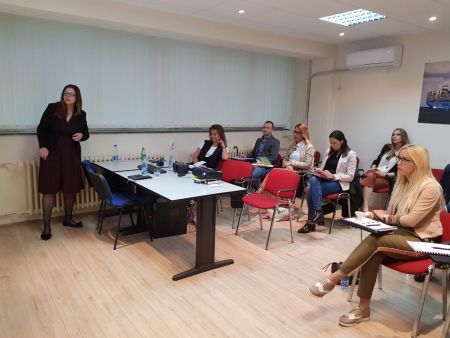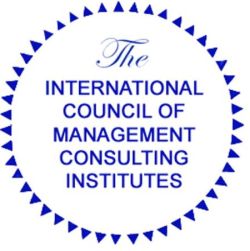Aleksandra Hristov
Strategic Communication Consulting
Mineco Group has fulfilled its Plans for 2019
Posted by Aleksandra Hristov on January 16th, 2020 under Events | No Comments »
Hristov Consulting on media language at the Serbian Chamber of Notaries Symposium
Posted by Aleksandra Hristov on December 15th, 2019 under Events | No Comments »
Serbian Chamber of Notaries Symposium, over the weekend of 14th and 15th December 2019, at the mountain Kopaonik (Serbia) resort, had their Fourth yearly symposium where they discussed the rules of the notaries practice, their role in taxation process, and creating and use of the electronic documents.
Within the format of the symposium, the Hristov Consulting consultants, that have cooperation with the Serbian Chamber of Notaries since June 2018., gave their presentation about the results of their work, and on the subjects of the language of the media and the professional attorneys’ terminology in media environment.
“Ever since we collaborate with SCN, jointly and within the media deadlines, we have responded to more than 40 journalists’ requests, and we had created and distributed 15 press releases about NPA and notaries activities”, Gordana Lazarević, Hristov Consulting consultant said.
Ms. Lazarevic added that Hristov Consulting has received a positive feedback from the journalists following NPA, who all agreed they regularly receive timely and precise information without any avoiding of answering all the questions.
However, journalists stated that on some occasions the answers tended to be overly complicated and elaborate, fact that motivated Hristov Consulting to, on this symposium, devote attention to the questions of the language in the media and use of the professional terminology, with intent to limit its use and explanations.There was also a debate in reference to the language style related to the particular media profile, and how to avoid any confusion among journalists and wider public while following the various media.
At the symposium the notaries and their assistants from 133 offices in Serbia were present and actively took part in various panels.
The fourth yearly symposium of Serbian Chamber of Notaries: Work on regulating the notary practice
Posted by Aleksandra Hristov on December 14th, 2019 under Events | No Comments »
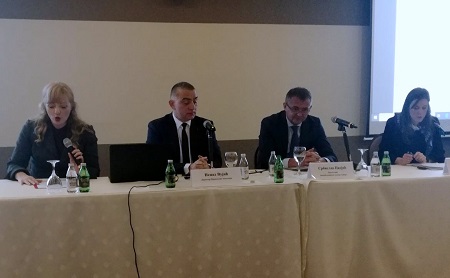
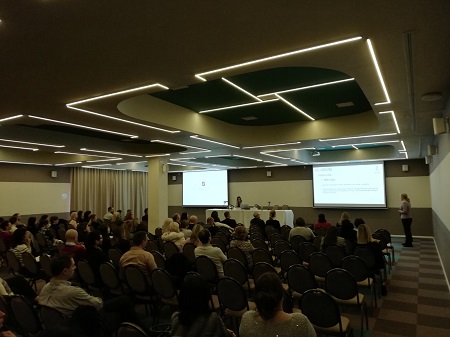
Crisis communication lecture to Faculty of Economics students in Belgrade
Posted by Aleksandra Hristov on November 13th, 2019 under Events | No Comments »
Aleksandra Hristov, director of Hristov Consulting, the only certified consulting firm for communication strategy in Serbia, gave a lecture on crisis communication to the students of the fourth year of the Faculty of Economics in Belgrade, at the invitation of Professor Galjina Ognjanov.
Students had the opportunity to hear from experienced professional and practitioner in the field of crisis communication, whose consulting firm has successfully solved more than 50 crises of its clients. At the same time, they learned about crises, whether and how could you prepare for crises, how to manage crises, or to be a successful navigator in crisis, what can be learned from crises and why it is important to manage reputation.
“I am very pleased to be at the Faculty of Economics in Belgrade for the fifth time and to share my experience with young people. Hristov Consulting is socially responsible business, and its consultants are always willing to give lecture to students on the strategic communications topics, which is our company’s expertise. I would like to pay my respect to professors such as Galjina Ognjanov who recognize the importance of inviting practitioners to be guest lecturers in order to allow their students to gain first-hand experience and thus contribute to the development of Belgrade University and society as a whole.” said Alexandra Hristov.
Hristov Consulting https://hristovconsulting.com/ also helps associations of persons with disabilities, as well as individuals who contribute to the development of society. Hristov Consulting is engaged in management consulting in the fields of reputation, media relations, crisis management, law and PR, public affairs and lobbying.
Propaganda as the enemy, communication as the ally of the media
Posted by Aleksandra Hristov on September 21st, 2019 under Articles | 1 Comment »
This article was published on September 19, 2019, in Novi Magazin, Serbian weekly. Ms. Aleksandra Hristov, the director of Hristov Consulting, a certified consulting firm for communication strategy and education in that area has spoken about the illicit connection between various actors in the society and the media that exists for years and makes it difficult to be independent and work in the public interest. This same matter was also commented by Mr. Dragan Janjic, the chief editor of Beta media agency-
Following is the article in its integral version:
“Propaganda as the enemy, communication as the ally of the media”
The cooperation of the media and the public relations sector naturally influences the newspaper texts that are reaching the public on a daily basis. However, the ethical and the judicial boundaries that are meant to protect the public interest during that cooperation are overlooked all too often. The companies, organizations, institutions, political parties, and individuals that appear in public and are influencing truthful and objective informing instead of protecting the public, and they become themselves the tools of disseminating untrue data in creation of the distorted picture of the reality.
“The media and the Public Relations (PR) are two different jobs, with different priorities. The media, journalists and the chief editors, should emphasize their task of protecting the public interest, whereas PR offices want to promote the corporate or organization’s interests for which they are working. In any case, the public interest should be cared for, with the awareness that with some professions such as journalists and public agencies such interest should be the first priority. That is nothing unusual as this is done this way throughout the world. The problems arise when different roles, and the priority goals get mingled, and when the media agrees to put, instead of the public interest, the interest of the company or organization served by its PR, on the first place. That happens either by mistake, when the journalists and the chief editors do not recognize that the public and corporate, organizational interests diverge, or when they do it deliberately”, says Mr. Dragan Janjic, the chief editor of the media agency Beta.
According to his assessment, in the first case, when the mistake was accidental, things can be fixed relatively easily, however, in the second case we are witnessing a potentially dangerous collusion that can be detrimental to the society and damage the public interest. “The drastic example with the tragic consequences occurred recently, during the 1990-ies, when the propaganda machineries of the sides in the war conflict in the former Yugoslavia acted as the deliberate war mongering vehicles, and the majority of the media was transmitting whatever was served to them”, Mr. Janjic reminded us.
The task of the PR sector that is representing the companies, organizations, institutions, political parties, and individuals should be, above all, to communicate with the media that are free from the pressure related to their media business. In practice that means that the task of the PR is to enable the free communication between the media and PR clients, to provide them with the truthful information, while media has the obligation to check all the facts, ant to release to the public the information that is important to the public interest.
Ms. Aleksandra Hristov, CMC, internationally certified business consultant in the area of the public communication, believes that the practice of the illicit collusion between various actors in society and media exists for years, and must be stopped immediately. “It is truly important that the media and PR sector become aware that at any moment they have the obligation to work in accordance to law, ethical codes, and international standards. This is the only way to avoid the errors that can be dangerous to the public interest”, says Ms. Hristov.
According to her words, the PR sector has an obligation, moral and judicial, regardless of what it does for the client or the boss, to respect the facts, truthful data, therefore the public interest, as it is always meant to be the case with the media in general. “In that business, the media and the PR should be allies”, added Ms. Hristov.
The mainstream media domestically (in Serbia and the region) and in the world are going through the crisis, trying to adjust to the digital age and endless competition brought by the internet. That competition, no doubt, has not brought the quality yet. However, it brought the high dependence of the media on advertisers, and those want to send their propaganda messages not only through the classical advertisements but also through the informative content, albeit without the professional journalistic handling of the matter.
Answering the question whether the propaganda is the enemy of the enemy of the public interest, Mr. Dragan Janjic believes that it is not always the case, because the propaganda is the tool for dissemination of any particular ideas or messages . “When the ideas or the messages are those that are indeed in the public interest, propaganda is allowed even in the media. Therefore, PR can help the media and the public reach various information content with the positive effect to individuals and society, however, the contrary is also possible. The main transmitter of the information is the media, and they should be the filter and the guarantor that everything stays within the perimeter of public interest”, says Mr. Janjic.
With this theme he is in agreement with Ms. Aleksandra Hristov who points out that we are often confronted with the public campaigns that are surely in public interest. “There is no problem when the organizations and businesses want to promote their results and community service based on facts. Serbia has PR outlets that are perfectly equipped and creative to handle such campaigns. The media, very often has ear for such campaigns. The problem arises when the client does not realize that his particular narrow interest is not in public interest, and as a consequence, some PR sectors start propagating the falsehood. That is not an allowed behavior by the PR, and the media itself before anyone, must react and deny such propaganda the media space without fear such action can produce the financial harm on them”, adds Ms. Hristov.
In any case, much work remains to be done in defining both better and clearer rules for the PR and media relationship. Implementing the laws and professional codes of conduct pertaining to media and PR is the key that should bring the quality to this area. Mr. Janjic emphasizes it would be ideal to somehow separate these things, if PR activities could be centered on drawing the attention to the importance of some product, idea or decision, without the indirect or direct influence of the companies or organizations on media business policy.
One thing that should be excluded from this two way communication between the media and PR is the blackmail, that if the media filters the PR content, it loses the client who pays the advertizing space. Furthermore, it should become unacceptable that the media without any checking or sanctions releases the false information whereby misleading the public and hurting the wider interest. The step toward respecting the clear professional rules is needed on both sides. This is in every citizen’s and wider public interest.
The article is part of the project “Propaganda as the enemy, communication as the ally of the media”, that is going to include the analysis of the conditions in this area through the opinion articles from the PR experts, and journalists contributing their views and own case studies. Through this project weekly Novi Magazin wants to promote the awareness about the importance of the media laws and professional codes of conduct implementation, including the imperative of applying the international standards in the media and PR interactions regardless of their own relationships with the political parties and businesses. Novi Magazin project is financed by the Embassy of the United States of America in Belgrade, Serbia.
Five years of notary public profession in Serbia
Posted by Aleksandra Hristov on September 14th, 2019 under Events | No Comments »
Presentation of ISO 20700 guidelines for managing of business consulting services
Posted by Aleksandra Hristov on June 21st, 2019 under Events | 1 Comment »
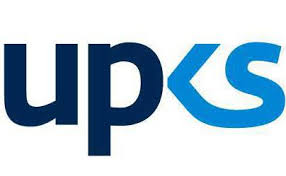
Serbian Association of Lobbyists held 2nd training session on lobbying
Posted by Aleksandra Hristov on May 22nd, 2019 under Events | No Comments »
Election Assembly of the Association of Management Consultants of Serbia
Posted by Aleksandra Hristov on February 28th, 2019 under Events | No Comments »
The Association of Management Consultants of Serbia (UPKS) held a regular election assembly, where Aleksandra Hristov, Director of Hristov Consulting was elected President of the Managing Board, and Daniel Tavčioski, an independent consultant, was elected President of the Association’s Assembly.
At the fifth assembly of the Association of Management Consultants of Serbia Andrija Gencel, independent consultant, Dario Daničić, director of Intema consulting from Belgrade, Borislav Čubrilo, director of BUS Computers from Kikinda and Ljubiša Petrović, director of the Smart Management Solutions Agency, were elected for the two-year mandate as the members of the Managing Board.
Aleksandra Hristov, who held the office of president of the UPK Assembly in the previous mandate, pointed out that the goals of the new management are promotion of the values of UPKS and the opportunities it provides, motivation of a greater number of consultants to join the association, and the realization of full membership in the International Council of Management Consulting Institutes (ICMCI).
“For 10 years, the Association has managed to bring people together with integrity, to be an affiliated member of the ICMCI umbrella organization, which brings together business consultants in 50 countries, and is a guarantee of quality in providing consulting services to clients” said Hristov.
The Association of Management Consultants of Serbia is an associate member of the International Council of Management Consulting Institutes ICMCI, a global organization that brings together the most prominent management consultants worldwide and awards CMC certificates that are the only internationally recognized brand dedicated to individual business advisers. By awarding the CMC certifications in 2012, the Association of Business Consultants of Serbia was recognized as a partner of the ICMCI in Serbia.



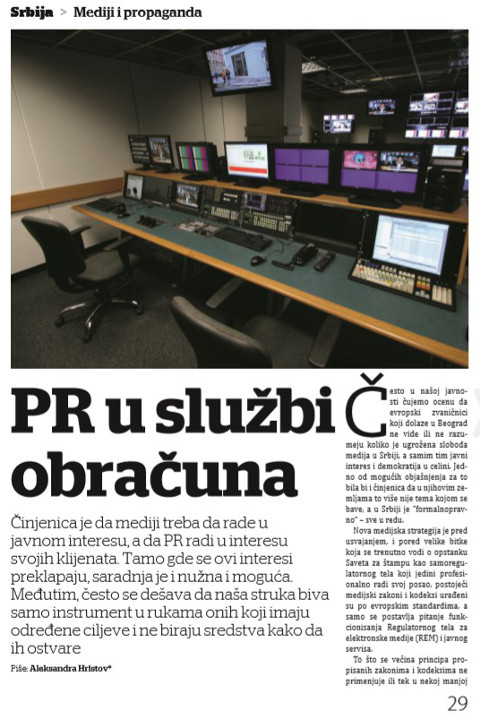
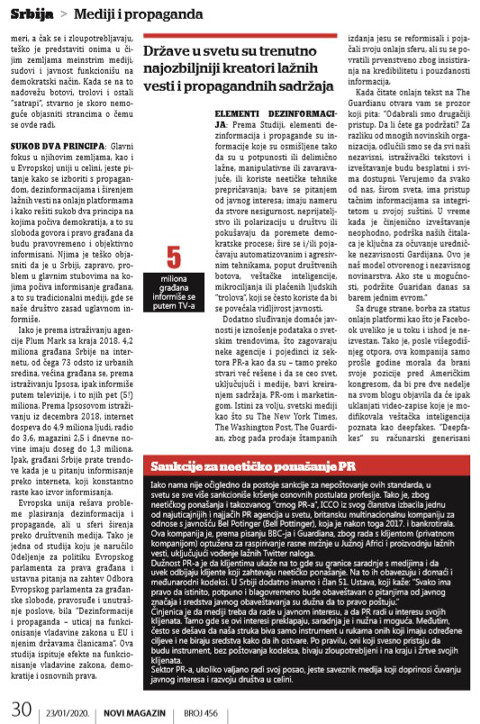
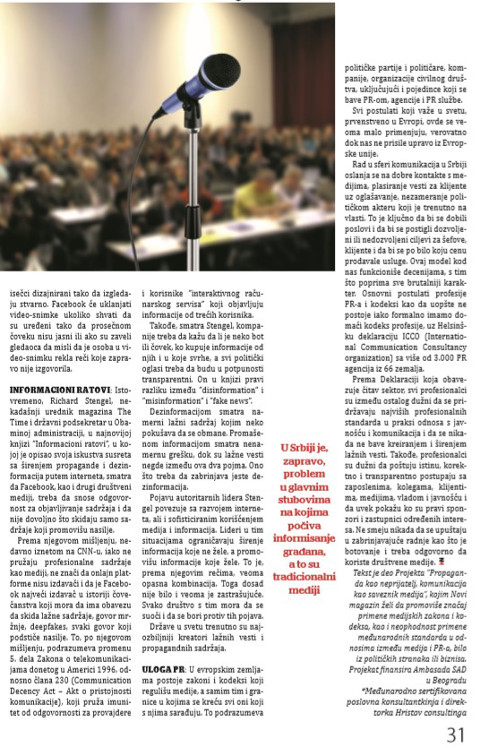
 Follow
Follow



